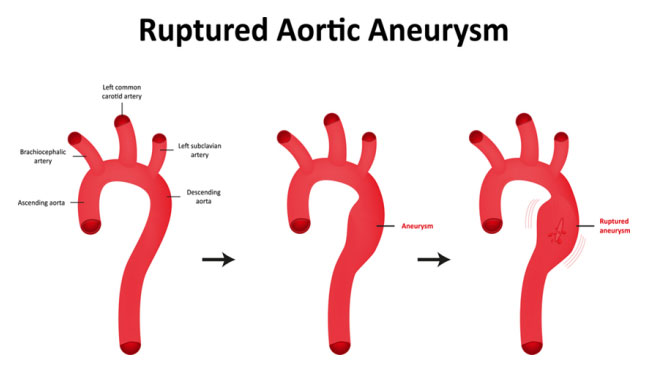Traumatic Thoracic Aorta Rupture – Have you ever wondered how the chest is affected after being crushed by the steering wheel during a major car accident? If so, read the details below.
Cause
● A sudden traumatic rupture of the thoracic aorta is caused by blunt force trauma related to a motor vehicle accident (MVA), a fall, or a crushing injury.
● The trauma affects the portion of the aorta that lies within the chest.
● Seatbelts do not protect against this type of injury.
● Rupture of the thoracic aorta occurs in 22% of fatal blunt trauma.
● Traumatic Thoracic Aorta Rupture is the second most common cause of death after a head injury.
● Rupture of the thoracic aorta requires immediate surgery!
● Therefore, if someone is suspected of a possible Rupture of the thoracic aorta, please call 911, or drive the person directly to the nearest ER.
Symptoms
● Severe chest pain
● Coughing
● Shortness of breath
● Back pain
● Hoarseness
● Difficulty swallowing due to a compressed esophagus
● Bruising on the front of the chest wall due to blunt force trauma
Diagnosis
● The medical treatment depends on the severity and type of injury.
● During a clinical assessment, patients may show high blood pressure and heart murmurs are auscultated due to blow flowing over the tear.
● A physical exam and imaging are required.
● A computed tomography (CT) scan is the definitive diagnosis of traumatic aortic rupture.
● An Angio CT scan is the gold standard diagnostic test for an aortic rupture.
o This type of scan allows physicians and surgeons to study the entire body in a few seconds.
Treatment
● Possible surgery for endovascular repair
● Open surgical repair
● Medicine to keep the blood pressure and heart rate controlled
Note: Prognosis for patients with a traumatic thoracic aorta rupture is poor.

References
Joshua. (2021). Labeled Diagram.
NIH. (2020). Aortic dissection.
Samett, E. J. (2015). Aortic Trauma Imaging.
